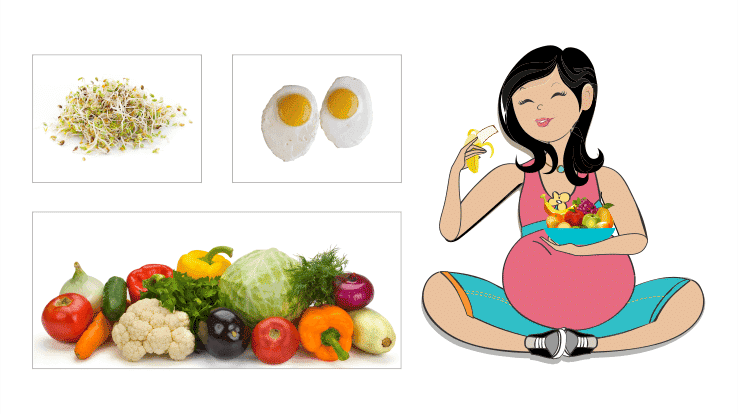9 Essentials of a Perfect ...
9 Essentials of a Perfect Pregnancy Diet

An expecting mother has the entire health of the baby depending on her. The right nutritious diet during pregnancy, not only ensures birth of a healthy child, but also reduces complication during child birth and is a gift of health to the child for life. Good nutrition means, safe and healthy outcome of pregnancy, both for mother and her newborn.
Since good nutrition is crucial, certain foods listed below, which when taken, apart from the regular diet, help in meeting the extra demands of nutrients during pregnancy.
Must-have Pregnancy-time Nutrients Foods for Expecting Mothers
More Similar Blogs
1.) Milk and Milk products, buttermilk
These foods provide good-quality calcium (and proteins) required in pregnancy. Adequate calcium intake during pregnancy is crucial. It is required for the development of the bones, teeth and the entire skeletal structure of the growing foetus. It is also very important for the mother’s own well-being. If an expecting mother is not taking enough calcium, her own bones are de-mineralised and will be unable to meet the growing foetus’s requirements as well as expose her to a host of bone-related diseases for the future. Drinks like buttermilk also help in dealing with acidity issues, common during pregnancy.
2.) Black Chana/whole Moong Sprouts
They provide the best vegetarian source of proteins, another nutrient, very essential for the growth of the foetus. They also provide B complex vitamins, zinc, iron--all crucial nutrients required during pregnancy. They also provide fiber which helps avoid constipation, a common complaint in pregnancy. Include them in your daily diet as curries, salads or as sandwich/parantha stuffing.
3.) Green Leafy Vegetables
Green leafy vegetables, especially dark green ones like sarson, chulai, bathua, chana saag, and cauliflower leaves are rich in iron and Vitamin A (required for the baby’s vision and eye health). More than normal RDA (required daily allowance) of iron is required during pregnancy to meet the growth needs of foetus and maternal tissues. Green leafy vegetables, especially spinach, are also good source of folic acid. Folic acid is crucial for the brain development of the foetus. It also protects baby from neural tube disorders. So, do include green leafy vegetables, atleast three times a week to get loads of vitamins, minerals and antioxidants. Saute them, boil-blend and use to knead dough, add to dosa batter or dahi to make a raita, or simple make an appetizing sandwich or salad of them. Read More: How Helpful is Green Tea during Pregnancy
4.) Eggs, Meat & poultry
For an expecting mother of a non-vegetarian food habits, these are the best sources of proteins. Eggs have the best protein profile in accordance to our body’s requirements. They are good source of vitamins and minerals especially folic acid, choline and iron. These help to keep the amniotic membranes strong and help in preventing birth defects in the baby. Meat/poultry is rich in animal protein that helps in cell and muscle development in the baby. Having adequate quantity of protein, through diet, can also help an expectant mother fight pregnancy induced fatigue. Opt for lean meat as they are the best source of high-quality protein sans the fats.
5.) Wheat Germ
Wheat Germ has loads of zinc, vitamin E, and also some amounts of folic acid and calcium. Zinc is required in pregnancy for foetal cellular division and protein synthesis. Deficiency of zinc may lead to poor birth outcomes and low birth weight. It is also a good source of dietary fiber, protein, vitamin B6, magnesium and copper. This makes wheat germ a dense source of nutrients required by the expecting mother. Add roasted wheat germ to your chapattis, curries or salads.
Watch this video on must-have pregnancy-time diet
6.) Iodised Salt
Iodine is required for physical and mental growth of the foetus. It is also essential to avoid cretinism (mental retardation) in the growing foetus. The easiest way to get iodine in diet is through using iodised salt. But again, as with any foods use in moderation. Too much of salt can also kickstart blood pressure issues.
7.) Orange Rich in fibery
This fruit is rich in vitamin C and folic acid. It helps in development of the cells and tissues and helps in increasing the absorption of iron. It is also a good source of thiamin and potassium, and a very good source of dietary fiber.
8.) Coconut Water
It is an excellent way to add more fluids to the body. Extra fluids help in proper of circulation through the foetal system, ensuring the proper health of the baby. It also is a good source of vitamins and minerals which are required in extra amounts in pregnancy. It is high in electrolytes, chlorides, potassium, and magnesium and has a moderate amount of sugar, sodium and protein. It's also a good source of dietary fibre, manganese, calcium, riboflavin and Vitamin C.
Read More: Coconut water during Pregnancy
9.) Watermelon
This watery fruit is not only a good source of electrolyte like potassium, but is low in sodium, cholesterol, and helps in relieving the symptoms of pre-eclampsia (hypertension and oedema) a complication of pregnancy. It is also a good source of iron, the demand of which is increased during pregnancy. This is especially of importance to vegetarian pregnant women, who do not get enough iron through their vegetarian diets. Suggest Reading: Chart - Ideal Bay Weight during 4, 6 or 7 Pregnancy
Be the first to support
Be the first to share
Comment (0)




